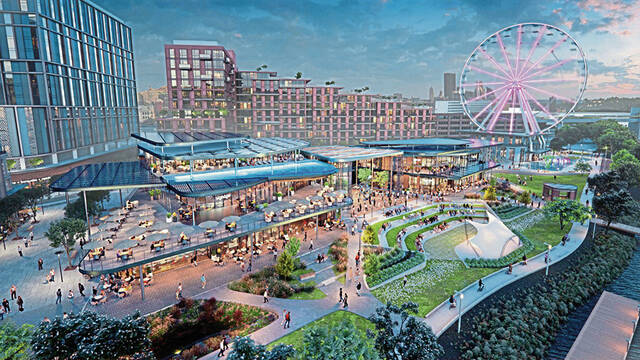https://triblive.com/local/community-group-rails-against-esplanade-in-pittsburgh-despite-assurances-from-developer/
Community group rails against Esplanade in Pittsburgh, despite assurances from developer

A community group on Thursday raised environmental concerns about the Esplanade development, a $740 million project that aims to transform a brownfield in Pittsburgh’s Chateau neighborhood into a vibrant entertainment district.
Manchester Neighbors, representing a group of residents, opposes the project. In a report released Thursday, the group highlighted environmental impacts of building on a brownfield property.
“When you examine this, it’s a thing of all that glitters is not gold,” Manchester Neighbors founder Stanley Lowe said at a news conference at the site.
He alleged that the developer, Cecil-based Piatt Companies, withheld information about hazardous materials on the 15-acre property.
Piatt spokeswoman Molly Onufer said the project has received necessary approvals from the Pennsylvania Department of Environmental Protection and engaged an environmental consultant to study the site.
“Nothing on this site stuck out as unexpected for a brownfield in Pittsburgh,” Onufer said, adding other similar brownfield sites have been developed elsewhere around the city.
Another riverside brownfield in Pittsburgh’s Hazelwood neighborhood is being redeveloped as Hazelwood Green, which will include a robotics center, a biomanufacturing facility, an athletic field and housing.
A clean-up plan for the Esplanade property approved by the Department of Environmental Protection includes clean fill cover across the site, Onufer said.
The report from Manchester Neighbors identified 58 different “hazardous compounds” in the soil and groundwater, including arsenic, lead, cobalt, mercury, thallium and vanadium.
“The soil has to be carefully remediated,” said Daniel Holland, a post-doctoral fellow at Carnegie Mellon University’s Center for African American Urban Studies and the Economy, who compiled the report.
Mark Urbassik, a founding principal of KU Resources and the project’s environmental engineer, said Esplanade must comply with state laws that aim to ensure redevelopment at former industrial sites do not cause health or ecological issues.
“We are confident that no health or environmental problems will result from the proposed development,” he said in a written statement.
Plans for development
Plans for Esplanade include a massive Ferris wheel, restaurants, retailers, riverfront recreation, entertainment areas, public restrooms, a grocery store and an incubator for local entrepreneurs. The development also will include a 126-unit condo complex, a 13-story hotel and a mixed-income apartment tower.
Despite concerns from Manchester Neighbors, Esplanade has largely earned widespread support. The city, county and school district signed off on a tax diversion to support the project. No residents live on the site, so no one will be displaced by the development.
With a new marina, a winter garden and green spaces, the developer hopes Esplanade will become a key first-day attraction for the city.
The development will be built on underutilized riverfront land largely cut off from Manchester by Route 65.
According to Piatt’s plans presented to the city’s Planning Commission, six existing buildings “that are in various states of disrepair” will be torn down. As of February, Piatt’s commercial leasing team was helping businesses that still occupy two of the buildings on site to relocate.
More concerns
Manchester Neighbors raised concerns about tearing down some of the structures within Esplanade’s footprint. The group argued three warehouses constructed in the 1920s should be preserved.
“This is the erosion of our history,” Lowe said.
He also argued Piatt did not have enough community engagement, though the developer has boasted of a robust public process. Public participation also was included in meetings before the Pittsburgh Planning Commission, Pittsburgh City Council, Allegheny County Council and the Pittsburgh Public Schools Board ahead of votes approving the project’s plans and creating a tax diversion.
Onufer said the developer is planning to break ground in the fall. About a year of site work — including razing existing buildings and putting in new utilities — will precede building.
Financing and site control are ongoing, she said, “but will be finalized soon.”
Copyright ©2026— Trib Total Media, LLC (TribLIVE.com)
